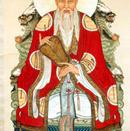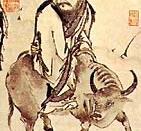#2Discuss the parallels between Kafka' and Lao-Tzu's way of imparting a new sort of understanding in the reader, of "telling the story." [Again, there's serious "grist for the mill" here when you reflect upon the way we dealt with the two this session. So, go ahead, give it a shot!)Franz Kafka was born onto a middle class German speaking Jewish family on July 3, 1883 in Prague. Lao Tzu was born either in the 4th or 6th century BCE somewhere in China, depending on which historian tells the story. Two very different places and times, two very different men with very different pieces of work and yet their messages are resoundingly similar. One started a religion the other started a movement. Each of Kafka's works are powerful, inspirational and more importantly insightful. They force the reader to look at themselves and do some self examination. Lao Tzu imparts wisdom very subtly as does Kafka.
Kafka wrote how he lived. His writing was poignant but timid. He was very intelligent and highly educated but he was timid and nervous. He was living in a time when his people were being persecuted and when writers were not very respected. He was the son of a man he could never please. He wrote stories based around his life but in a very different style. The majority of his tales are unbelievably normal and very unbelievable all at the same time. It was about me and every other reader of his work. Kafka leads the writer to a place and gives a little bit of a story and forces the reader to think very deeply about the meaning as does Lao Tzu. Neither writer forces anything.
The Tao Te Ching, by Lao Tzu is said to contain hidden meanings for the...


